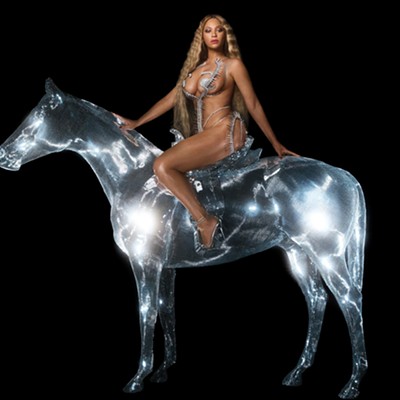by Alan Sculley, Luke Baumgarten and Lindsay Williams & r & In early reviews of the latest Dave Matthews Band album & lt;a href= & quot;http://click.linksynergy.com/fs-bin/click?id=rQy1MLe70wI & amp;offerid=78941.433008999 & amp;type=10 & amp;subid= & quot; &
Stand Up & lt;/a & , some writers have been struck by the serious -- even dark -- nature of the lyrics and music. This reaction makes sense in light of the group's reputation -- particularly in a live setting, which you can experience at this weekend's shows at the Gorge -- for generating a loose, freewheeling vibe built around songs with a sunny, carefree feel. Matthews, while not fully agreeing that Stand Up is darker than the average DMB outing, acknowledges that a more serious tone is entirely appropriate in this day and age.
"I think that maybe there's a dark quality to some of them, but I think there's also a very hopeful quality to many of them," says Matthews. "And also, I think that these are pretty dark times, in many ways. So if we're just singing about bubble gum, or temporary gratification, then, you know, our heads truly are up our asses, so I'm glad people think it's a little bit darker."
To hear Matthews allude to today's unsettled times shouldn't come as a surprise. After all, the Dave Matthews Band participated in last fall's "Vote for Change" tour that was inspired largely by opposition to the war in Iraq and sought to generate support for Democratic Presidential candidate John Kerry in his effort to unseat President George W. Bush. The messages of that tour echo on occasion throughout Stand Up -- and the lyrics don't seem ambiguous at all.
The most obvious example comes on "Everybody Wake Up (Our Finest Hour Arrives)," which refers to "the man with the bomb in his hands" and offers what appears to be a telling observation on leaders who send their citizens to war: "See the pig dressed in his finest fine/The believers stand behind him/As the day lights up with fire." That same "pig dressed in his finest fine" verse reappears in the next song, "Out of My Hands," in which the protagonist is perched on a ledge expressing his feelings of fear, betrayal and uncertainty.
Stand Up also has upbeat moments, such as the sweet and nostalgic "Old Dirt Hill (Bring Back That Beat Back)" and the firm promise of love and commitment, "Steady As We Go."
Regardless of how one perceives the similarities and contrasts between Stand Up and other Dave Matthews Band albums, the album got off to an emphatic start commercially, debuting at No. 1 on the Billboard magazine album chart. That's nothing new. Since bursting into the mainstream in 1994 with Under the Table and Dreaming, the group has enjoyed one blockbuster album after another with such releases as Crash (1996), Everyday (2001) and Busted Stuff (2002).
The band might be even more popular as a live act, as this summer's amphitheater tour has drawn sell-out crowds. And Matthews says he and his bandmates are still delivering spirited shows.
"We all seem to be in a very good head space right now about the new music and about the direction that it's gone," he says. "We've been having a lot of fun playing this stuff."
Dave Matthews Band and the North Mississippi Allstars at the Gorge on Friday-Sunday, Aug. 19-21 starting at 7 pm each evening. Doors open at 4 pm. Tickets: $48-$60. Call: 735-0500 or visit www.ticketmaster.com.
Sick and Burly & r & Ask a musician to describe his musical aesthetic to you, and chances are he'll be at no loss for words. Ask a musician to describe his style to you in only two words, and he'll be less prepared. Local metal outfit Rutah is the exception.
"Sick and burly," says lead guitarist Mark Pettit without hesitation.
Battering Eastern Washington's extreme music scene since 1999, Rutah combines a diverse mix of metal methods -- from death to grindcore -- in a forcible, blackened sound that incorporates a plentiful helping of wrath and ruin.
"We're constantly trying out new stuff, new sounds," says bassist and co-vocalist Pat Sullivan. Pettit, rhythm guitarist and vocalist Erik Loss and drummer Cassidy Kleinman round out the band.
"Rutah doesn't necessarily fit into any one category," says Loss, who with Pat Sullivan, Pat's brother Ian Sullivan and previous drummer Beau Clemons formed the original Rutah lineup. Kleinman replaced Clemons in 2003 and Pettit was added a few months later. Ian Sullivan recently left the band to pursue other interests.
Yet Rutah has filled a gap in Spokane's scene, exhibiting a sturdy self-reliance, a strong D.I.Y. ethic and hefty dose of perseverance. Successfully weathering the shifts in Spokane's musical trends, Rutah has maintained its sound while honing its mechanics. At the same time, the band has slowly but surely built a fan base, not only in Spokane, but among underground metal fans as far away as the Czech Republic.
"We went from pretty much clearing shows out to packing shows," says Loss.
Fans both local and international should get set -- Rutah's second self-release just hit the streets, and the band is following up its first West Coast tour with a series of local shows starting with one at Ichabod's East on Aug. 18 with Spokane black metal/grindcore project Doom Lit Sky and San Diego's 8 Fraud.
Rutah's live performances showcase both the band's increasingly sophisticated style -- evident in songs written in the weeks since the last tour -- and its earlier accomplishments, including its recently released full-length. Titled Hate From Days Long Past, the 10-track record is an exceptional follow-up to the band's 2002 demo and was written, recorded, produced and packaged solely by the band.
"Doing this ourselves really gave us the chance to make the record the way we wanted it to sound," says Loss, who writes the lyrics.
Rutah utilizes sounds reminiscent of a variety of extreme metal acts, from old school Slayer to rampantly evil black metal outfit Emperor. Vicious lead guitar work and shuddering rhythm provide the backbone of the record. Combined with morbid vocals, breathless tempo and strong bass lines, the result is fearsome, brutal and accomplished. And Loss dishes out an ample helping of both profane pomp and utter creepiness in his lyrical efforts, exploring concepts such as the fallacies of the religious right and current political unrest.
"We're super-heavy but super-clean," says Pat Sullivan, describing Rutah's maturing and varied sound. "We're not trying to fit into any technical black metal category. We're mixing it up and seeing what comes of it." -- Lindsay Williams
Rutah, Everything Beautiful and Doom Lit Sky on Thursday, Aug. 18, at Ichabod's East, 12116 E. Sprague at 9:30 pm. Cover is $3. Call 922-8801.
Metaphysical Cowboy & r & There's something there, on the horizon. Might be cattle rustlers, or dry lightning, or wild horses hard charging down off the butte there. It could be the wraith of some settler -- maiden of an unforgiving land -- taken before her time.
Or it might just be Michael Martin Murphey, America's "wandering cowboy poet," ambling down the rugged cat tracks of the northern Rockies for his engagement at DiLuna's in Sandpoint tonight.
A true prince of the sagebrush, Murphey has been making records about prairie life since the early '60s. His album Blue Sky - Night Thunder was awarded the first gold record for a cowboy singer since my man Marty Robbins last told the story of old Texas Red, who "tried to match the Ranger with the big iron on his hip" and met with a very grave end. Though Murphey and Robbins team up to cover that famous outlaw ballad on Rhymes of the Renegades, Murphey's original songwriting work has tended more toward Emerson than Wyatt Earp.
Which is good, because these days there's enough tragedy for a minstrel of America's dwindling plains -- between urban sprawl, the disappearance of the family farm and the death of the cattle drive -- without delving into the hundred-year-gone mythos of the wild west. Murphey, then, has become the voice of that dying breed of human who still knows what it means to trust a horse with life and livelihood.
Having studied medieval history and classical literature, Murphey's songs have a sense of context and grandeur not often found in trail songs. And, though his proximity to the summer of love is unknown, his time spent in Austin during the late '60s left him something of a metaphysical cowboy. Murphey occupies a massive plot of land in the expanse of country music that he tends by himself. It's as lonely, desolate and beautiful as his beloved plains themselves. -- Luke Baumgarten
Michael Martin Murphey at Di Luna's in Sandpoint on Thursday, Aug. 18, at 7 pm. Dinner will be served before the show. Tickets: $20; $25, at the door. Call (208) 263-0846.
Dave Takes a Stand
[
{
"name": "Broadstreet - Instory",
"insertPoint": "5",
"component": "25846487",
"requiredCountToDisplay": "5"
},{
"name": "Broadstreet - Instory",
"insertPoint": "10",
"component": "25846487",
"requiredCountToDisplay": "10"
},{
"name": "Broadstreet - Instory",
"insertPoint": "15",
"component": "25846487",
"requiredCountToDisplay": "15"
},{
"name": "Broadstreet - Instory",
"insertPoint": "20",
"component": "25846487",
"requiredCountToDisplay": "20"
}
]















